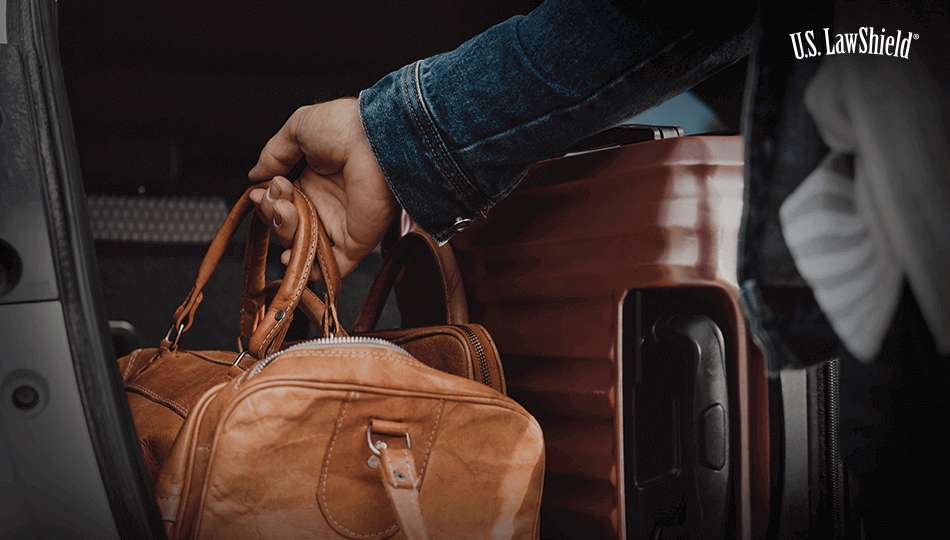
The time for holiday shopping and family get-together preparations is about to reach its summit. People are rushing to and from their vehicles with hardly a second glance at their surroundings. One distracted moment is all a criminal needs to get into your vehicle to steal your belongings, or worse, make you the victim of an assault or robbery. Situational awareness is key: be mindful of your surroundings, gravitate toward lit areas in parking lots, scan the area for any possible threat, and have a plan in mind for retreat or cover. But what happens when a law-abiding gun owner finds themselves in the sights of a criminal?
During the holiday season, many holiday shoppers are caught unaware by theft, robbery, or burglary of their vehicles. It is critical that you, as a law-abiding gun owner, understand what legal response is allowable and justified for each of these criminal actions before you find yourself in the middle of one of these terrifying incidents.
Understanding Justified Use of Force
Especially if you carry a handgun, knowing the law on the justified use of force and deadly force to prevent a crime will help you develop a plan before an incident takes place. Theft, robbery, and burglary are all too common around the holidays. We don’t want you to become a victim, so let’s address each of these.
Theft
Let’s imagine that you’re walking out of a store after shopping for presents. It’s late, but the parking lot is still pretty full of last-minute holiday shoppers. You push your cart across the lot while practicing situational awareness. The cart is just loaded with bags of presents you’ve bought for your family and friends. Upon reaching your car, you let go of the cart and begin searching for your keys. Just then, a person appears out of nowhere, grabs a few of the bags from the cart, and starts running away. This is known as “theft.”
Theft is when a person obtains or exerts control over property of the owner without his or her permission. 720 ILCS 16-1(a) (1). Generally, theft alone with no other aggravating factors does not justify the use of deadly force.
Robbery
Let’s change our earlier scenario. This time, the parking lot is pretty empty, save for a cluster of cars where you’re parked. As you reach your car and begin searching for your keys, a masked man appears from behind the car. He tells you quietly that you can either let him walk away with the shopping cart, or he’ll kill you. Illinois defines this as “robbery.”
Robbery in Illinois is considered a felony. A person commits the offense of robbery when he or she knowingly takes property, except a motor vehicle covered by Section 18-3 or 18-4, from the person or presence of another by the use of force or by threatening the imminent use of force. 720 ILCS 5/18-1(a). As you can see, robbery, as opposed to theft, involves the use of force. Robbery, being a felony under Illinois statutes, would allow the use of force and possibly deadly force, under certain circumstances.
Remember force should be proportionate and in response to an imminent threat. If the offender grabs your wallet or purse and is running away, they are no longer an imminent threat and therefore deadly force would not be appropriate. Additionally, only use as much force as is necessary to stop the threat or the commission of the offense. Each case is fact specific and the trier of fact (judge or jury) would consider if you acted reasonably at the time.
Burglary
Let’s switch our scenario once more. This time, your car is at the very edge of all those that are parked in the lot. As you’re approaching it, you notice that the back, passenger-side window has been shattered. Droplets of glass are on the pavement and someone is rummaging around in the back seat, where you put the bags from your shopping trip earlier in the afternoon. This is defined as “burglary.”
Burglary of a vehicle is another crime that is common in parking lots around the holidays. Burglary is also considered a forcible felony in Illinois.
“A person commits burglary when without authority he or she knowingly enters or without authority remains within a building, housetrailer, watercraft, aircraft, motor vehicle, railroad car, or any part thereof, with the intent to commit therein a felony or theft.” 720 ILCS 5/19-1(a).
Again, although burglary to your auto would be classified as a felony, you must consider the circumstances as we stated for any other felony. Seeing someone breaking into an unoccupied car would justify using force, but using deadly force would be excessive. The offender would not be considered an imminent threat to your safety, and you may be able to use force less than deadly force to stop the commission of the offense. The prudent thing would be to call 911 immediately.
Armed with situational awareness and an understanding of the self-defense laws in Illinois, you can protect yourself from the criminal element and keep yourself on the right side of the law this holiday season. Although Illinois allows the use of force (sometimes deadly force) to prevent the commission of a felony, the trier of fact would consider all the facts. If the offender was attempting to take your property and was not an imminent threat to you, they may find the force was excessive and not justified.
For any further questions regarding self-defense over the holiday season, call U.S. LawShield and ask to speak to your Independent Program Attorney.
The preceding should not be construed as legal advice nor the creation of an attorney-client relationship. This is not an endorsement or solicitation for any service. Your situation may be different, so please contact your attorney regarding your specific circumstances. Because the laws, judges, juries, and prosecutors vary from location to location, similar or even identical facts and circumstances to those described in this presentation may result in significantly different legal outcomes. This presentation is by no means a guarantee or promise of any particular legal outcome, positive, negative, or otherwise.




Leave A Comment